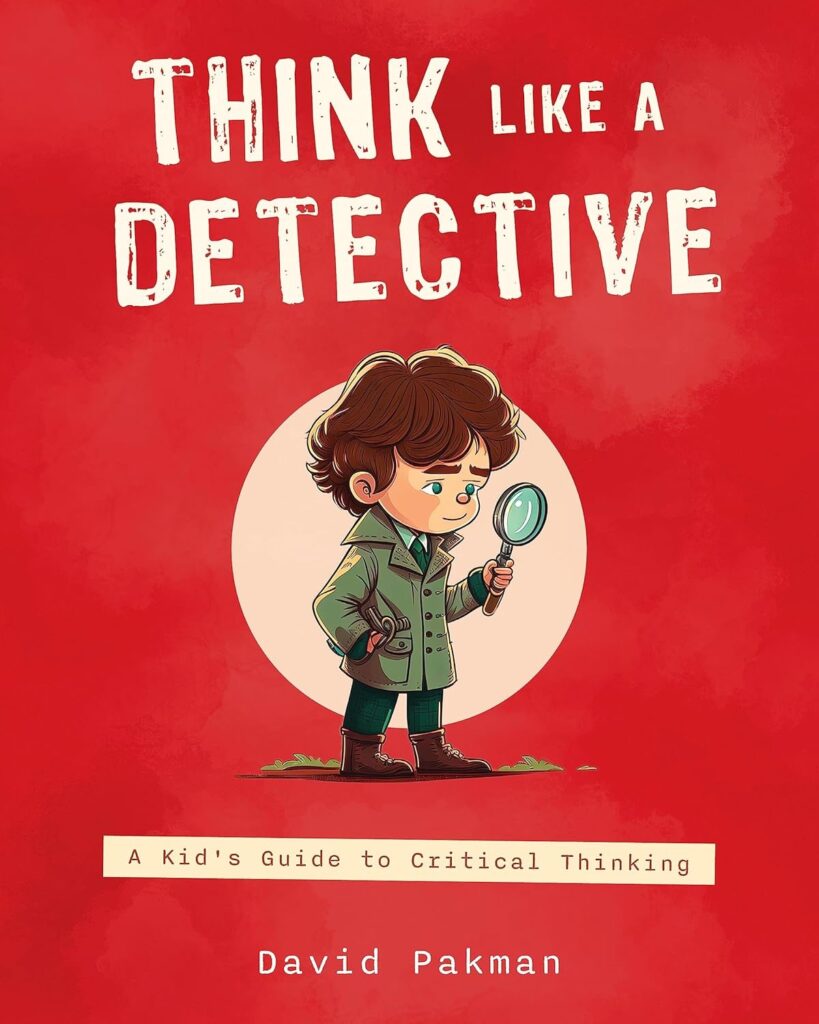Think Like a Detective: A Kid's Guide to Critical Thinking is an insightful and empowering book designed to teach children how to approach problems with a curious and analytical mindset. Written in an engaging and accessible way, it uses detective-like scenarios to help kids develop essential life skills, such as reasoning, observation, and deduction. These skills are not only valuable for problem-solving but also for making better decisions in a variety of life situations.
Helping Kids in Different Parts of Life
This book is highly beneficial in numerous ways, as it equips children with skills that extend beyond just solving mysteries. Here are some key aspects where Think Like a Detective can make a difference in children’s lives:
- Developing Emotional Awareness and Empathy: While the book focuses on critical thinking, this process naturally encourages emotional awareness and empathy. Learning to assess situations carefully and understand multiple perspectives can help children recognize emotional cues in their environment, an essential skill for navigating relationships, especially in challenging circumstances. For children who may be growing up in homes affected by domestic abuse, understanding emotions, recognizing warning signs, and thinking critically about their safety and wellbeing become crucial.
- Problem-Solving in Complex Situations: One of the core elements of the book is teaching kids how to break down problems into manageable parts. This is not only applicable to schoolwork but also to real-life scenarios, such as conflict resolution, whether it’s in friendships, family relationships, or peer dynamics. By promoting logical thinking and a step-by-step approach, children can navigate difficult situations with more confidence. If a child is experiencing or witnessing domestic abuse, the ability to assess the situation and think critically about potential actions—such as seeking help from trusted adults—becomes a life-saving skill.
- Building Confidence and Self-Advocacy: Critical thinking encourages independence. The more children practice making reasoned decisions, the more they trust their own judgment. This can be especially important for children in environments where their confidence may be diminished due to exposure to controlling or abusive behavior. Learning to trust their instincts, ask the right questions, and challenge false information empowers them to advocate for themselves and others.
- Recognizing Manipulation and Coercion: Domestic abuse situations often involve psychological manipulation and control. By fostering critical thinking skills, the book helps children recognize when someone is trying to deceive or manipulate them. This is an essential life skill that can protect children from grooming, coercion, and other forms of emotional manipulation, whether it comes from peers, authority figures, or family members.
- Encouraging Communication and Dialogue: As children learn to think critically, they also become better at articulating their thoughts and feelings. This skill is vital in situations where open dialogue can be the first step toward getting help. A child who understands how to ask questions, express concerns, and seek clarification can more easily communicate with teachers, counselors, or social workers about their experiences.
- Understanding Boundaries and Safety: Part of thinking critically is learning to identify personal boundaries and recognizing when they are crossed. This book subtly introduces concepts of personal safety by teaching kids to question what feels wrong and to trust their observations. This awareness can help children identify unsafe situations, particularly in domestic settings where boundaries are frequently violated.
How It Can Support Children in Domestic Abuse Contexts
Given your focus on domestic abuse awareness and intervention, Think Like a Detective could serve as an essential tool in your business. Teaching critical thinking and problem-solving can provide children with mental frameworks that protect them emotionally and physically. For children who may be experiencing domestic abuse, learning to identify patterns of behavior, separating truth from manipulation, and knowing how to respond to red flags can be the first step toward seeking help and ensuring their safety.
It’s important to note that while the book itself may not explicitly address domestic abuse, the foundational skills it provides—critical thinking, emotional awareness, and decision-making—are invaluable in such contexts. You could consider incorporating the book into educational programs, therapy sessions, or as part of a support system for children affected by abuse. By helping children think critically, you’re giving them tools to navigate their circumstances with greater agency and insight.
Writing Style and Accessibility
The author writes in a friendly, engaging tone that is perfect for young readers. The examples and scenarios presented are relatable and age-appropriate, making it easy for children to follow along and apply the lessons to their own lives. The detective framework is also fun, which helps maintain the reader's interest while teaching important lessons.
Final Assessment
Think Like a Detective: A Kid's Guide to Critical Thinking is a powerful resource for children, especially those who may need guidance in understanding complex or harmful situations like domestic abuse. Its focus on building independent thought, emotional awareness, and problem-solving skills can help kids gain confidence and better navigate the world around them. For your business, this book could be an essential part of helping children develop resilience and self-advocacy in the face of difficult and potentially abusive situations.
By combining this book with a more focused intervention on domestic abuse education, you can foster an environment where children learn not just to survive but to thrive in challenging circumstances.
COLLAPSE


